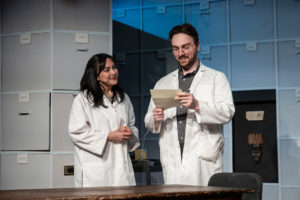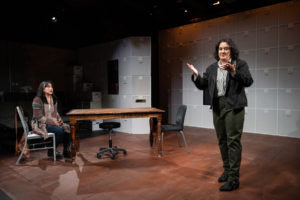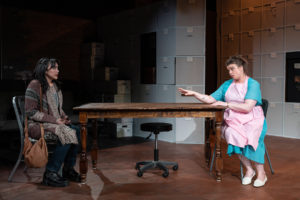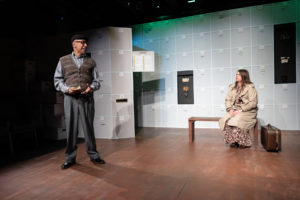
 [rating=4]After fifteen years of sparking meaningful discussion among Chicago audiences, AstonRep Theatre Company’s final season closes with Julia Cho’s “The Language Archive.” Directed by Dana Anderson, this thoughtful show centers around George (Sean William Kelly) a professor of linguistics whose goal is to preserve the last vestiges of dying languages for posterity. Although he is a well-educated scholar and researcher, loved and respected by his colleagues, that does not mean that he knows how to communicate his feelings in a way that satisfies his wife Mary (Erin O’Brien). From her perspective, when her husband appears to be overly consumed with his job, she feels that their marriage is playing second fiddle. She tries talking with her husband—but is there something else she must do to find fulfillment in life? The theme of language and its uses underlie both the comedy and tragedy of this play. Nicely done is how well the playwright integrates her characters’ personal and professional lives with cleverly written dialogue about the need for people to successfully communicate with each other, regardless of what language they speak.
[rating=4]After fifteen years of sparking meaningful discussion among Chicago audiences, AstonRep Theatre Company’s final season closes with Julia Cho’s “The Language Archive.” Directed by Dana Anderson, this thoughtful show centers around George (Sean William Kelly) a professor of linguistics whose goal is to preserve the last vestiges of dying languages for posterity. Although he is a well-educated scholar and researcher, loved and respected by his colleagues, that does not mean that he knows how to communicate his feelings in a way that satisfies his wife Mary (Erin O’Brien). From her perspective, when her husband appears to be overly consumed with his job, she feels that their marriage is playing second fiddle. She tries talking with her husband—but is there something else she must do to find fulfillment in life? The theme of language and its uses underlie both the comedy and tragedy of this play. Nicely done is how well the playwright integrates her characters’ personal and professional lives with cleverly written dialogue about the need for people to successfully communicate with each other, regardless of what language they speak.
Riddled with guilt for not learning to speak his grandmother’s now dead language, George breaks the fourth wall and addresses the audience at the show’s onset. We learn that he gathers speakers from around the world to talk into cassette tape recorders in their native languages and that he holds their audio recordings at his university’s language archive. Today he and his assistant Emma (Aja Alcazar) are to record a married couple named Resten (Jorge Salas) and Alta (Génesis Sánchez), the last two speakers of their (fictional) language who have just been flown in from abroad. Comedy is introduced when Resten and Alta squabble in George’s language lab. Not only does this lighten the mood but provides us with interesting insights about traditional customs and ways of thinking. People from different origins can view the world very differently and can express their thoughts and feelings in ways that are enlightening from the audience’s standpoint. Introducing unappetizing food—no matter what the culture—always has a way of being funny! Hence, “The Language Archive” is also a story about recipes: about foods whose ingredients are relatively homogenous or distinctively delicious. A language can be thought to be akin to a recipe with its own characteristic flavor and charm. A key phrase used in this show is the word “starter.” A different starter and a different recipe can impart a unique taste and texture to both breads and languages. The analogy is brilliant!
The main plotline, centered around George’s life, is wonderful and very real. Not so successful, however, is the introduction of some imaginative subplots which, from my point of view, are somewhat over-the-top. For example, a Freud impersonator with a German accent tells Emma that she has to remove her emotional block that is preventing her from learning Esperanto, a language that she wants to share with George (who speaks it fluently). The psychotherapist eventually traces Emma’s difficulty in learning the language to the fact that she won’t tell George that she loves him. Emma also happens to meet L. L. Zamenhof, a Polish ophthalmologist who invented Esperanto in 1887 as an auxiliary language (with the intention that it might bind people of the world together). Since the play takes place in the contemporary era and Zamenhof is supposed to be dead, he is very much alive when they travel onboard a train and have an interesting conversation. Somewhat less problematic is the deus ex machina when Mary tries to figure out what to do with the rest of her life. But serendipity being what it is, she unexpectedly meets a person who changes her future path. Now putting these few subplots aside, the genuine changes we notice in both George’s and Mary’s personalities over time offset a lot of the hokeyness in the script. When a number of profound truths are revealed throughout the play, this makes the entire performance well worth seeing.
Above all, Anderson’s direction is great! The actors are convincingly distanced on stage whenever they interact among themselves and when they address the audience directly. Movement from one scene to the next is smoothly done, and the audience can easily imagine all sorts of diverse interior and exterior locales without a hitch; the story is never lost. That said, I would have made some different choices regarding the scenic design. The set largely consists of file cabinets, archival boxes, brick walls, and a red tile floor. These, unfortunately, don’t work so well when the scenes shift from the language archive to George and Mary’s house, to the train platform, to the hospital room, etc., etc. To my mind, a multi-purpose set should have been built instead. Perhaps a backdrop in sections could have better framed the action. That said, I liked the props, such as the hospital bed, the display with the different breads, the various placards, and the like, all thanks to Jeremiah Barr’s efforts. Becca Venable’s lighting design and Robert Tobin’s sound design work well in this small space. Costumes by Andrés Mota are fitting. Dialect and vocal coach Bethany Hart and assistant dialect and vocal coach Kelley Holcomb have both done a fine job with imparting an array of accents.
What we discover from watching this performance is that all languages have nuances associated with them, and each conveys ideas with a slightly different twist. Not only is a given language made up of words, expressions, and references, but its vibrance, sweetness, and melodiousness (or even its gruffness) can affect its speakers in a visceral way. One of the most telling lines in this story revolves around the idea that you need language to understand the world, but you also need the world to understand language. A language without an underlying social and cultural context thus lacks a certain richness. To my mind, playwright Cho implies that an invented universal language like Esperanto could never work well as a primary language because of its lack of ties to a dynamic historical past.
Every two weeks—as George tells us at the beginning of the show—another language disappears from the planet. When certain languages are lost because of natural disasters (like tsunamis), or because of wars and invasions (where one nationality wins and may become culturally dominant), or when parents choose to teach their children one language over another, we lose the patterns of thinking and feeling inherent to that specific channel. Lost is a unique recipe for examining the human condition and living a particular style of life. When dominant languages build on the history of an already existing vocabulary and grammar, they can grow deeper roots. Dying languages, however, are having their roots cut off. But all is not lost: Cho makes the point throughout that love can transcend the meaning behind the spoken word in any language. Hence, loving couples may choose to create their own means of expression, using their own “starter” and building a language all their own.
“The Language Archive” is playing through May 28, 2023, at The Edge Off-Broadway Theater, 1133 W. Catalpa Avenue, in Chicago.
General admission tickets are $20.
Student/seniors discounts available.
Performance schedule:
 Thursdays, Fridays, and Saturdays at 7:30 p.m.
Thursdays, Fridays, and Saturdays at 7:30 p.m.
Sundays at 3:00 p.m.
For more information and to purchase tickets, go to https://www.astonrep.com/language or call 773-828-9129.
For general information, please see https://www.astonrep.com/.
COVID requirements are as follows: Masking is required within the theatre itself and in the lobby when not actively eating or drinking.
To see what others are saying, visit www.theatreinchicago.com, go to Review Round-Up and click at “The Language Archive”.






More Stories
“The Firebugs” reviewed by Julia W. Rath
“The Book of Grace” Al Bresloff with another from Paul LIsnek
“The Last Five Years” MILWAUKEE